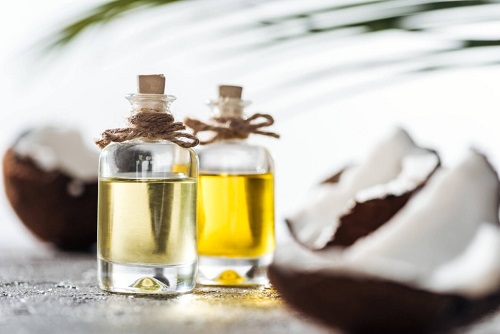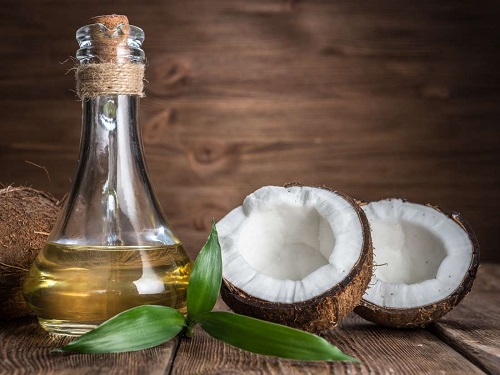Here’s a thorough analysis of Castor Oil vs. Coconut Oil, focusing on their individual properties, applications, and benefits!

Regarding natural oils, two popular choices often dominate the beauty and health industries—castor oil and coconut oil. These versatile oils have garnered a reputation for their myriad benefits, making them staples in households. However, if you are confused about deciding between the two, here’s a detailed guide on Castor Oil vs. Coconut Oil, describing their unique properties and applications.
Explore here about the effectiveness of castor oil for athlete’s foot.
What Is Castor Oil?
Derived from the seeds of the Ricinus communis plant, castor oil is a versatile natural substance with a wide range of applications. Its high viscosity and density make it a popular choice in multiple industries, including cosmetics and automotive lubrication. The thick consistency of the oil enables it to adhere well to skin and hair, providing lasting hydration and protection.
Can castor oil help psoriasis? know here
Understanding Coconut Oil
Coconut oil, extracted from the meat of mature coconuts, is a versatile oil widely used for its culinary, cosmetic, and health benefits. Rich in saturated fats and medium-chain triglycerides (MCTs), it is known for its quick absorption and energy-boosting properties. In skincare, its natural moisturizing effects and antimicrobial components make it a popular choice for combating dry skin and minor infections.
Here is all you need to know about castor oil for Crohn’s Disease
Castor Oil vs. Coconut Oil for Hair Growth
Castor Oil for Hair Growth
Gaining prominence as a natural aid for hair growth, castor oil is a nutrient-dense elixir enriched with vitamin E, omega-6 fatty acids, and proteins. These elements actively nourish hair follicles and stimulate growth. Application of castor oil on the scalp enhances blood circulation, ensuring the delivery of essential nutrients to the hair roots.
Its antimicrobial qualities contribute to a healthier scalp, minimizing issues like dandruff that can inhibit hair growth. Ricinoleic acid, a key component of castor oil, strengthens hair strands and minimizes breakage.
Coconut Oil for Hair Growth
Coconut oil is another effective natural solution for promoting hair growth. Loaded with medium-chain fatty acids, it penetrates the hair shaft, reducing protein loss and fortifying hair strength.
Its inherent antifungal and antibacterial properties contribute to a cleaner and healthier scalp, thus decreasing the likelihood of infections that may disrupt hair growth. Lauric acid in coconut oil specifically binds to hair proteins, further reducing hair loss and breakage.
Castor Oil vs. Coconut Oil for Skin
Castor Oil for Skin
When considering skin care, castor oil emerges as a noteworthy contender. Castor oil boasts a rich concentration of fatty acids, primarily ricinoleic acid. These properties make it a moisturizing powerhouse, helping to hydrate and nourish dry skin.
Moreover, castor oil has antimicrobial and anti-inflammatory qualities, making it an excellent choice for addressing issues like acne and inflammation. Regular application of castor oil can promote the production of collagen and elastin, contributing to healthier, more youthful-looking skin.
Coconut Oil for Skin
Coconut oil is a popular moisturizer for the skin, lauded for its ability to hydrate without clogging pores. Rich in medium-chain fatty acids and antioxidants, it can help improve the skin’s barrier function and has antimicrobial properties. These factors make coconut oil a suitable choice for individuals with dry or sensitive skin.
However, it may not be ideal for those with oily or acne-prone skin due to its comedogenic nature.
Learn about Castor Oil vs. Petroleum Jelly here
Castor Oil vs. Coconut Oil for Eyelashes
Castor Oil for Eyelashes
Often recommended for eyelash growth and nourishment, the high viscosity allows it to coat the eyelashes thoroughly, providing hydration and stimulating growth. The oil is rich in ricinoleic acid and omega-6 fatty acids, which can help strengthen and lengthen lashes over time. It’s essential to apply it carefully to avoid eye irritation.
Coconut Oil for Eyelashes
Coconut oil is another option for eyelash care. Its medium-chain fatty acids can penetrate hair fibers, offering moisturizing benefits. Though less viscous than castor oil, coconut oil is lighter and can be easier to apply. It can nourish lashes without weighing them down, making it a good option for people who find castor oil too heavy.
Explore Castor Oil vs. Grapeseed Oil Comparision Guide here
Castor Oil vs. Coconut Oil for Eyebrows
Castor Oil for Eyebrows
For fuller and more robust eyebrows, castor oil is a popular choice. Its nutrient-rich composition, including ricinoleic acid, helps in nourishing the hair follicles and stimulating eyebrow growth. The oil’s high viscosity ensures it stays put, allowing for more effective overnight treatment.
Coconut Oil for Eyebrows
Coconut oil can also benefit eyebrow health. Its penetrative properties help moisturize the hair from within, making the eyebrows appear fuller and shinier. While it may not be as effective as castor oil in promoting new growth, its conditioning properties make it an excellent option for maintaining eyebrow health.
Can you mix castor oil with water? Know here
Castor Oil vs. Coconut Oil for Constipation
Castor Oil for Constipation
Used as a laxative for centuries, castor oil has proven effective in relieving constipation. When ingested, its active component, ricinoleic acid, stimulates the intestines, facilitating bowel movements. However, it should be used cautiously and under medical supervision due to its potent effects.
Coconut Oil for Constipation
Coconut oil offers a milder solution for constipation. Its medium-chain fatty acids can help soften stool and promote bowel movements. Though not as powerful as castor oil, coconut oil provides a gentler alternative for those looking for digestive relief.
Learn about 10 best natural products to replace castor oil Here
Castor Oil vs. Coconut Oil for Beard
Castor Oil for Beard
It is a popular choice for beard maintenance due to its rich, viscous nature and nourishing properties. Enriched with ricinoleic acid, it not only conditions and moisturizes the beard but also stimulates hair follicles to promote growth. The oil’s high viscosity ensures that it coats each hair strand thoroughly, providing a natural shine and a fuller appearance. It’s especially beneficial for those with patchy or coarse beard hair.
Coconut Oil for Beard
On the other hand, coconut oil offers a lighter alternative that’s easier to work into the beard. It is rich in medium-chain fatty acids and possesses natural antifungal and antibacterial properties, helping to keep the beard and underlying skin clean and free from itchiness. While it may not be as effective as castor oil in promoting new hair growth, its moisturizing and conditioning qualities make it an excellent option for daily beard care.
Learn about using castor oil for bruises here
Castor Oil vs. Coconut Oil for Dry Eyes
Castor Oil for Dry Eyes
Castor oil is often incorporated into eye drops designed for dry eyes due to its excellent lubricating properties. Its high viscosity allows it to provide a stable tear film, offering extended relief from dryness and irritation. However, it’s important to consult with a healthcare professional before using castor oil for this purpose, as improper use can lead to eye complications.
Coconut Oil for Dry Eyes
Coconut oil is generally not used directly for treating dry eyes, but it can be applied to the eyelids as a moisturizer. Its fatty acid composition can help to alleviate skin dryness around the eye area, indirectly offering some relief for dry eyes.
However, coconut oil is not recommended for direct application to the eyes and should not be considered a substitute for medical-grade eye drops or treatments.
Final Verdict
In a head-to-head comparison between castor oil and coconut oil, both oils offer distinct advantages depending on the application. Castor oil excels in promoting hair growth and offering potent relief for constipation and dry eyes thanks to its high viscosity and rich nutrient profile.
Coconut oil, on the other hand, is ideal for daily skin and hair maintenance, providing lighter, easily-absorbable moisturization and conditioning. Whether you’re looking for targeted treatment or everyday care, your choice between the two should hinge on your specific needs and concerns.
Learn about using Castor Oil for Nails here
FAQs
1. Which Oil Is Better For Promoting Hair Growth, Castor Oil, or Coconut Oil?
Castor oil is often recommended for hair growth due to its high content of ricinoleic acid, which can help nourish hair follicles. Coconut oil is also beneficial for hair health but may not be as effective for promoting growth on its own.
2. Can Castor Oil And Coconut Oil Be Used Interchangeably In Beauty Routines?
While both oils have skin and hair benefits, they have different consistencies and properties. Castor oil is thicker and stickier, making it better for targeted treatments, while coconut oil has a lighter texture and is more versatile.
3. Are Any Potential Side Effects or Allergies Associated With These Oils?
Individuals should always perform a patch test before using castor oil or coconut oil extensively because some people may be allergic to them. It’s important to note that ingesting large quantities of castor oil can lead to a laxative effect.
4. Can These Oils Be Used For Cooking?
People commonly use coconut oil for cooking because of its high smoke point and pleasant flavor. Castor oil is not advisable for cooking due to its strong taste and potential health risks.
5. Which Oil Is Better For Skin Moisturizing And Hydration?
People often prefer coconut oil for skin moisturizing because it is light, easily absorbed, and suitable for various skin types. Castor oil may be too heavy for some skin types but can still be beneficial for specific skin issues.
6. Can I Use These Oils Together In Beauty Treatments?
Yes, you can blend castor oil and coconut oil to create a customized beauty treatment. The combination can provide the benefits of both oils while achieving a desired consistency.
7. Are There Any Differences In Cost Between Castor Oil and Coconut Oil?
Castor oil is typically more expensive than coconut oil due to the labor-intensive process of extracting castor oil from its seeds.
8. Can Pregnant or Breastfeeding Individuals Use Castor Oil or Coconut Oil?
Pregnant and breastfeeding individuals should consult with a healthcare professional before using castor oil as a laxative.








love the combo of these oils. so wonderful and tasty too.. Thanks ladies
Hi Barbara, thanks very much! Castor oil + coconut oil is my favorite too 🙂 I don’t recommend ingesting it though!
Thanks i often use Castor oil and coconut for hair, maybe what if i mix them with olive oil?
Hey Anas, thanks for reading COG! Yes you could definitely mix it up and add in some olive oil. Read more about olive oil and castor oil here! 🙂
That’s what I do. I miss the 3 together and leave it on my hair for half an hour. My hair is well nourished and actually straighter and the mist or fog can’t make my hair kinky :)))
Castor oil and coconut oil is my favorite mix! I even use it for my face sometimes when it’s real dry. I usually apply a mix of 1/2 Castor for 1/2 Coco.
You are right! It’s a classic! So simple yet so efficient. Thanks for dropping by 🙂